Betriebliche Dynamiken und Beschäftigungsergebnisse
Firmengründungen und -schließungen sind in einer Marktwirtschaft für die Reallokation von Ressourcen, strukturellen Wandel und damit für die wirtschaftliche Entwicklung von zentraler Bedeutung und spielen vor allem im Hinblick auf die wirtschaftliche Transformation Ostdeutschlands eine zentrale Rolle. Gleichzeitig können die mit dem Strukturwandel verbundenen Arbeitsplatzverluste dramatische Folgen für betroffene Arbeitnehmer haben, wie z.B. Arbeitslosigkeit, Einkommensverluste oder eine geringere Arbeitsplatzqualität. Diese Forschungsgruppe untersucht mithilfe mikroökonometrischer Methoden Gründungen, Wachstumsprozesse und das Scheitern von Unternehmen, die Anzahl und Qualität der von Neugründungen geschaffenen Arbeitsplätze und die Folgen von Firmenschließungen für betroffene Arbeitnehmer und Arbeitnehmerinnen, vor allem in Bezug auf Arbeitsmarktergebnisse wie Beschäftigung und Löhne.
Forschungscluster
Produktivität und InstitutionenIhr Kontakt

Mitglied - Abteilung Strukturwandel und Produktivität
PROJEKTE
01.2020 ‐ 06.2024
Europas populistische Parteien im Aufwind: die dunkle Seite von Globalisierung und technologischem Wandel?
VolkswagenStiftung
Die Globalisierung hat zwar allgemein den Wohlstand gesteigert, aber in vielen Regionen Europas auch zu Arbeitslosigkeit, Lohnungleichheit, Abwanderung und Überalterung geführt. Das Projekt untersucht, ob diese ökonomischen Lasten zu Wählerstimmen für populistische Parteien führen.
01.2019 ‐ 06.2022
MICROPROD („Raising EU Productivity: Lessons from Improved Micro Data“)
Europäische Kommission
Ziel von MICROPROD ist es, zu einem besseren Verständnis der Herausforderungen beizutragen, die die vierte industrielle Revolution in Europa mit sich bringt. Verliert das Produktivitätswachstum im Kontext von Globalisierung und Digitalisierung an Schwung, und wenn ja, warum?
This project has received funding from the European Union’s Horizon 2020 research and innovation programme under grant agreement No 764810.
07.2018 ‐ 12.2020
Firmenlohndifferentiale in unvollkommenen Arbeitsmärkten: Die Rolle von Marktmacht und industriellen Beziehungen in der Aufteilung der Beschäftigungsrenten zwischen Arbeitnehmern und Arbeitgebern
Deutsche Forschungsgemeinschaft (DFG)
Ziel dieses Projekts ist es, die Aufteilung der Beschäftigungsrenten auf unvollkommenen Arbeitsmärkten und den Einfluss von Arbeitsmarktinstitutionen wie Tarifbindung und betrieblicher Mitbestimmung auf Firmenlohndifferentiale zu untersuchen. Über die Grundlagenforschung hinaus hat das Projekt damit Potential, wichtige wirtschaftspolitische Debatten zur institutionellen Ausgestaltung des Lohnfindungsprozesses zu informieren.
02.2019 ‐ 09.2019
Auswertung des IAB-Betriebspanels 2018 und Erstellung eines Ergebnisberichts für West- und Ostdeutschland
04.2016 ‐ 03.2019
Lohn- und Beschäftigungseffekte von Insolvenzen
Deutsche Forschungsgemeinschaft (DFG)
Ziel des Projekts ist es, erstmals den Prozess und die Folgen des Scheiterns von Unternehmen ausführlich zu analysieren. Insbesondere ist es im Rahmen dieses Projekts erstmals möglich, die Folgen kleinbetrieblicher Insolvenzen zu erforschen, was vor allem deshalb relevant ist, weil Arbeitnehmer in Betrieben mit weniger als zehn Beschäftigten etwa viermal so häufig von Insolvenzen betroffen sind wie Arbeitnehmer in Großbetrieben.
01.2018 ‐ 12.2018
Auswertung des IAB-Betriebspanels 2017 und Erstellung eines Ergebnisberichts für West- und Ostdeutschland
01.2017 ‐ 09.2017
Auswertung des IAB-Betriebspanels 2016 und Erstellung eines Ergebnisberichts für West- und Ostdeutschland
Referierte Publikationen
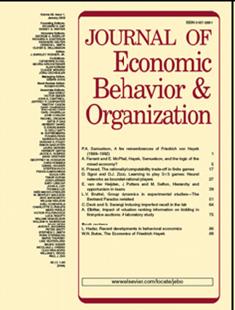
Team Building and Hidden Costs of Control
in: Journal of Economic Behavior and Organization, March 2016
Abstract
In a laboratory experiment, we investigate the interaction of two prominent firm strategies to increase worker effort: team building and control. We compare a team-building treatment where subjects initially play a coordination game to gain common experience (CE) with an autarky treatment where subjects individually perform a task (NCE). In both treatments, subjects then play two-player control games where agents provide costly effort and principals can control to secure a minimum effort. CE agents always outperform NCE agents. Conditional on control, however, CE agents’ effort is crowded out more strongly, with the effect being most pronounced for agents who successfully coordinated in the team-building exercise. Differential reactions to control perceived as excessive is one explanation for our findings.
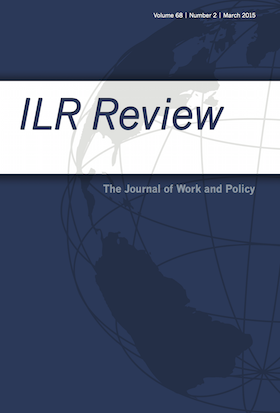
Dual Labor Markets at Work: The Impact of Employers’ Use of Temporary Agency Work on Regular Workers’ Job Stability
in: ILR Review, Nr. 5, 2016
Abstract
Fitting duration models on an inflow sample of jobs in Germany starting in 2002 to 2010, the author investigates the impact of employers’ use of temporary agency work on regular workers’ job stability. In line with dual labor market theory, the author finds that nontemporary jobs are significantly more stable when employers use temporary agency workers. The rise in job stability stems mainly from reduced transitions into nonemployment, suggesting that nontemporary workers are safeguarded against involuntary job losses. The findings are robust to controlling for unobserved permanent employer characteristics and changes in the observational window that comprises the labor market disruption of the Great Recession.
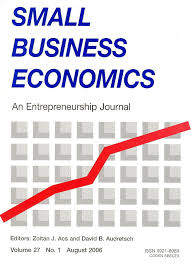
Spinoffs in Germany: Characteristics, Survival, and the Role of their Parents
in: Small Business Economics, Nr. 1, 2016
Abstract
Using a 50 % sample of all private sector establishments in Germany, we report that spinoffs are larger, initially employ more skilled and more experienced workers, and pay higher wages than other startups. We investigate whether spinoffs are more likely to survive than other startups, and whether spinoff survival depends on the quality and size of their parent companies, as suggested in some of the theoretical and empirical literature. Our estimated survival models confirm that spinoffs are generally less likely to exit than other startups. We also distinguish between pulled spinoffs, where the parent company continues after they are founded, and pushed spinoffs, where the parent company stops operations. Our results indicate that in western and eastern Germany and in all sectors investigated, pulled spinoffs have a higher probability of survival than pushed spinoffs. Concerning the parent connection, we find that intra-industry spinoffs and spinoffs emerging from better-performing or smaller parent companies are generally less likely to exit.
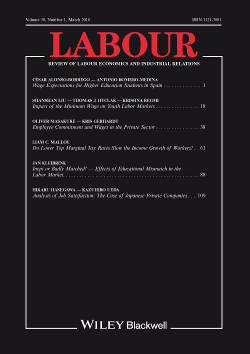
How Selective Are Real Wage Cuts? A Micro-analysis Using Linked Employer–Employee Data
in: LABOUR: Review of Labour Economics and Industrial Relations, Nr. 4, 2015
Abstract
Using linked employer–employee panel data for Germany, we investigate whether firms implement real wage reductions in a selective manner. In line with insider–outsider and several strands of efficiency wage theory, we find strong evidence for selective wage cuts with high-productivity workers being spared even when controlling for permanent differences in firms' wage policies. In contrast to some recent contributions stressing fairness considerations, we also find that wage cuts increase wage dispersion among peers rather than narrowing it. Notably, the same selectivity pattern shows up when restricting our analysis to firms covered by collective agreements or having a works council.

Does the Plant Size–wage Differential Increase with Tenure? Affirming Evidence from German Panel Data
in: Economics Letters, 2015
Abstract
We show that the major part of the plant size–wage premium in Germany is reflected in different wage growth patterns in plants of different size. This is consistent with the hypothesis that large firms ‘produce’ more skilled workers over time.
Arbeitspapiere
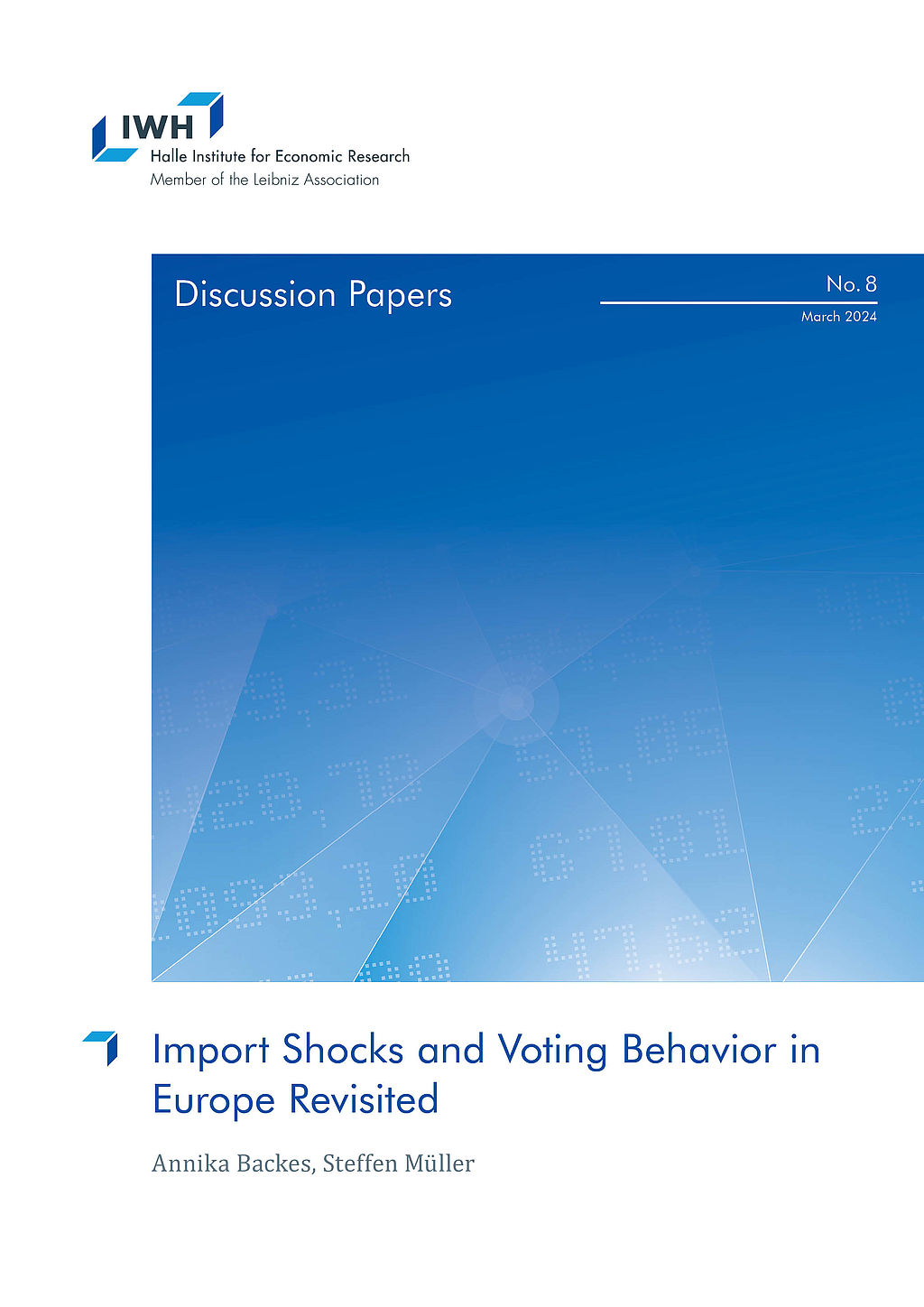
Import Shocks and Voting Behavior in Europe Revisited
in: IWH Discussion Papers, Nr. 8, 2024
Abstract
We provide first evidence for the long-run causal impact that Chinese imports to European regions had on voting outcomes and revisit earlier estimates of the short-run impact for a methodological reason. The fringes of the political spectrum gained ground many years after the China shock plateaued and, unlike an earlier study by Colantone and Stanig (2018b), we do not find any robust evidence for a short-run effect on far-right votes. Instead, far-left and populist parties gained in the short run. We identify persistent long-run effects of import shocks on voting. These effects are biased towards populism and, to a lesser extent, to the far-right.
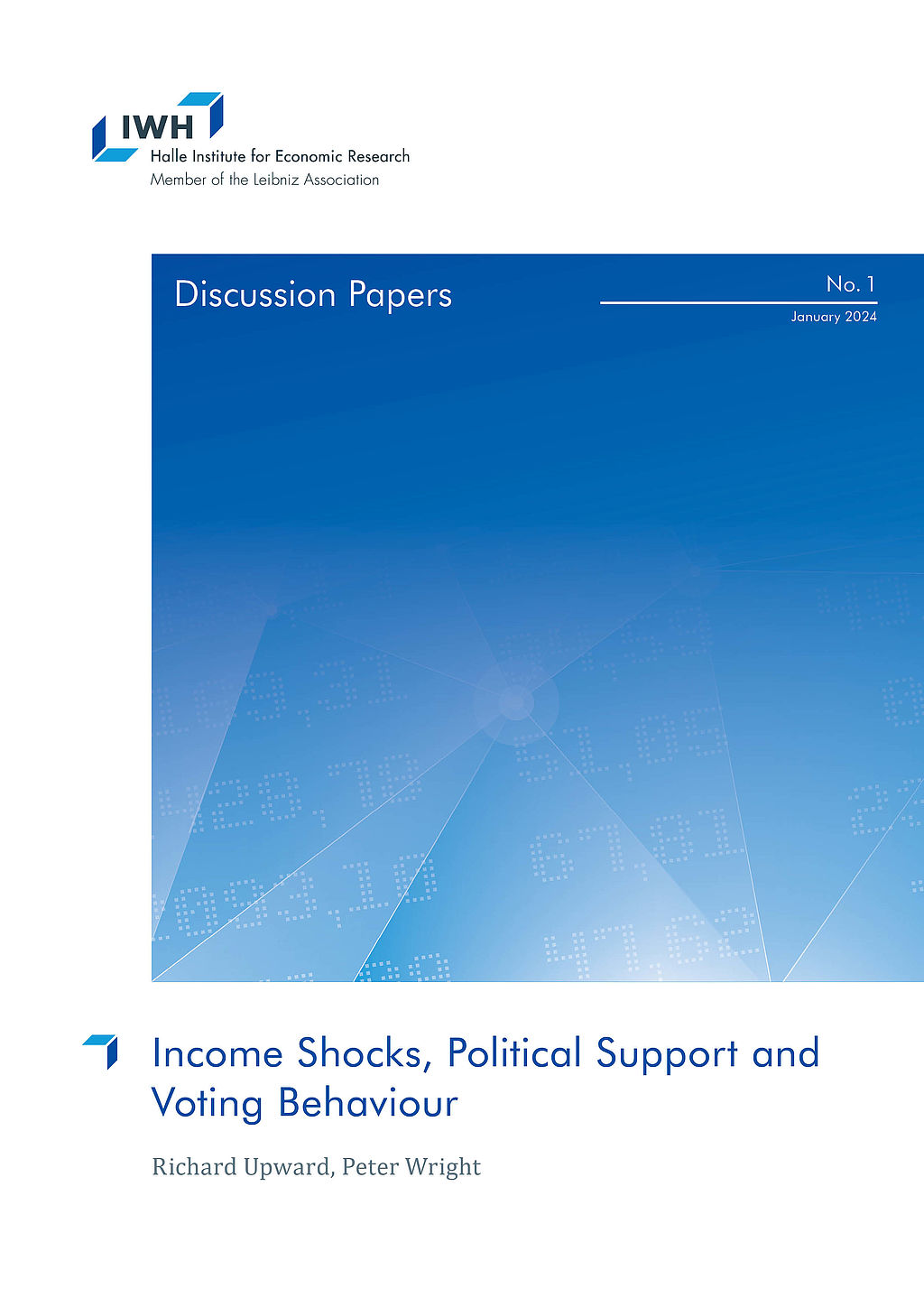
Income Shocks, Political Support and Voting Behaviour
in: IWH Discussion Papers, Nr. 1, 2024
Abstract
We provide new evidence on the effects of economic shocks on political support, voting behaviour and political opinions over the last 25 years. We exploit a sudden, large and long-lasting shock in the form of job loss and trace out its impact on individual political outcomes for up to 10 years after the event. The availability of detailed information on households before and after the job loss event allows us to reweight a comparison group to closely mimic the job losers in terms of their observable characteristics, pre-existing political support and voting behaviour. We find consistent, long-lasting but quantitatively small effects on support and votes for the incumbent party, and short-lived effects on political engagement. We find limited impact on the support for fringe or populist parties. In the context of Brexit, opposition to the EU was much higher amongst those who lost their jobs, but this was largely due to pre-existing differences which were not exacerbated by the job loss event itself.
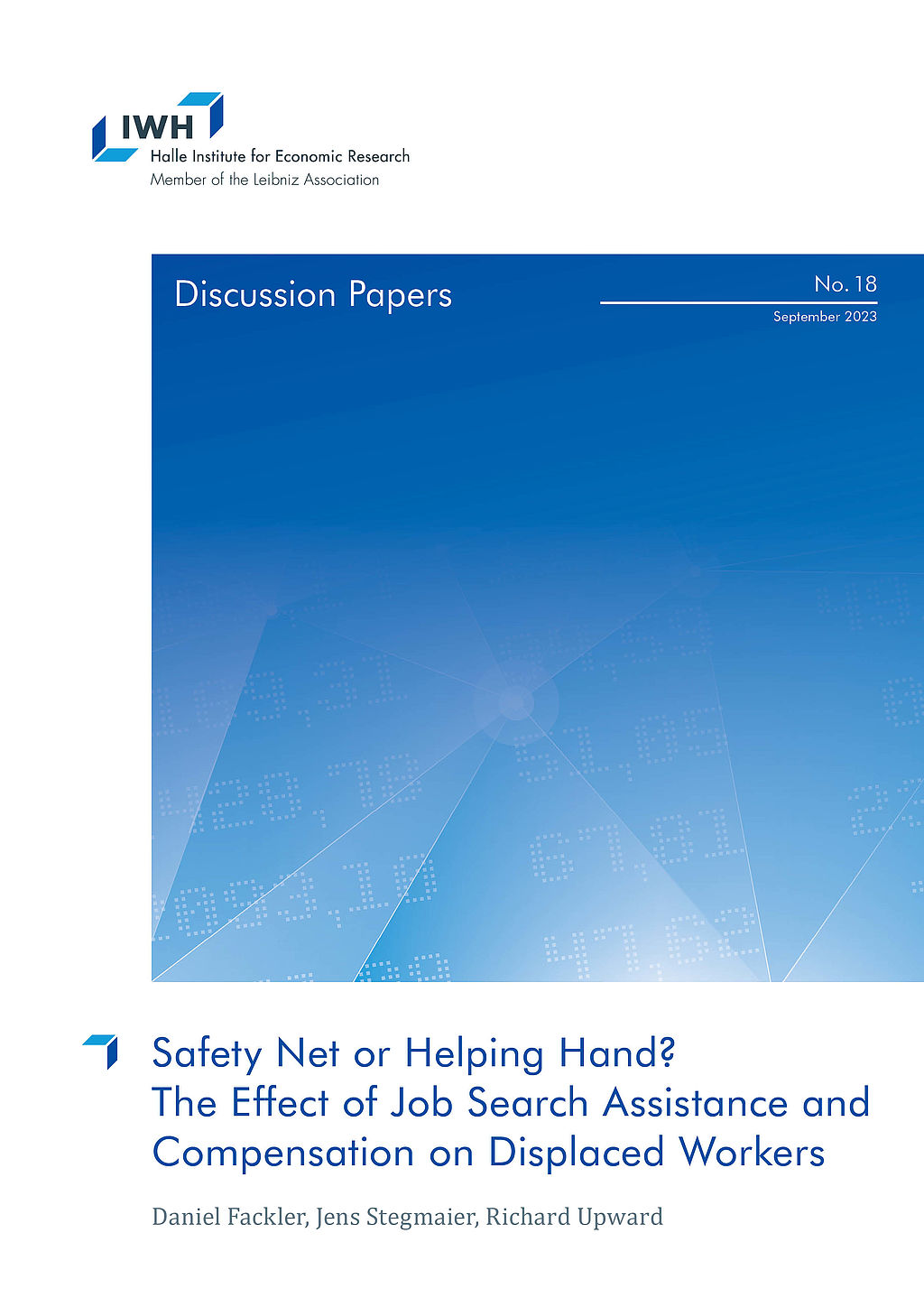
Safety Net or Helping Hand? The Effect of Job Search Assistance and Compensation on Displaced Workers
in: IWH Discussion Papers, Nr. 18, 2023
Abstract
We provide the first systematic evidence on the effectiveness of a contested policy in Germany to help displaced workers. So-called “transfer companies” (<i>Transfergesellschaften</i>) employ displaced workers for a fixed period, during which time workers are provided with job-search assistance and are paid a wage which is a substantial fraction of their pre-displacement wage. Using rich and accurate data on workers’ employment patterns before and after displacement, we compare the earnings and employment outcomes of displaced workers who entered transfer companies with those that did not. Workers can choose whether or not to accept a position in a transfer company, and therefore we use the availability of a transfer company at the establishment level as an IV in a model of one-sided compliance. Using an event study, we find that workers who enter a transfer company have significantly worse post-displacement outcomes, but we show that this is likely to be the result of negative selection: workers who lack good outside opportunities are more likely to choose to enter the transfer company. In contrast, ITT and IV estimates indicate that the use of a transfer company has a positive and significant effect on employment rates five years after job loss, but no significant effect on earnings. In addition, the transfer company provides significant additional compensation to displaced workers in the first 12 months after job loss.
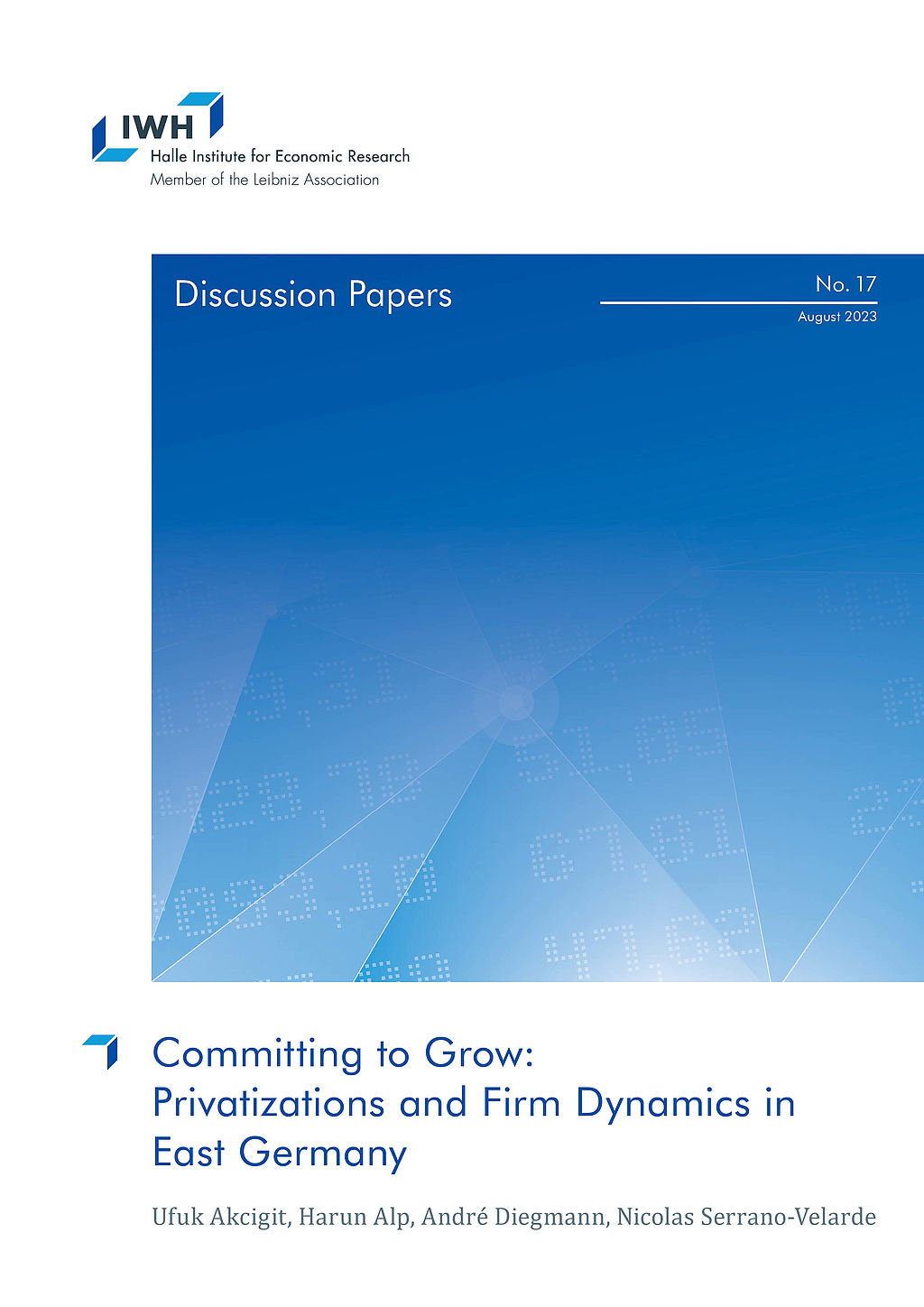
Committing to Grow: Privatizations and Firm Dynamics in East Germany
in: IWH Discussion Papers, Nr. 17, 2023
Abstract
This paper investigates a unique policy designed to maintain employment during the privatization of East German firms after the fall of the Iron Curtain. The policy required new owners of the firms to commit to employment targets, with penalties for non-compliance. Using a dynamic model, we highlight three channels through which employment targets impact firms: distorted employment decisions, increased productivity, and higher exit rates. Our empirical analysis, using a novel dataset and instrumental variable approach, confirms these findings. We estimate a 22% points higher annual employment growth rate, a 14% points higher annual productivity growth, and a 3.6% points higher probability of exit for firms with binding employment targets. Our calibrated model further demonstrates that without these targets, aggregate employment would have been 15% lower after 10 years. Additionally, an alternative policy of productivity investment subsidies proved costly and less effective in the short term.
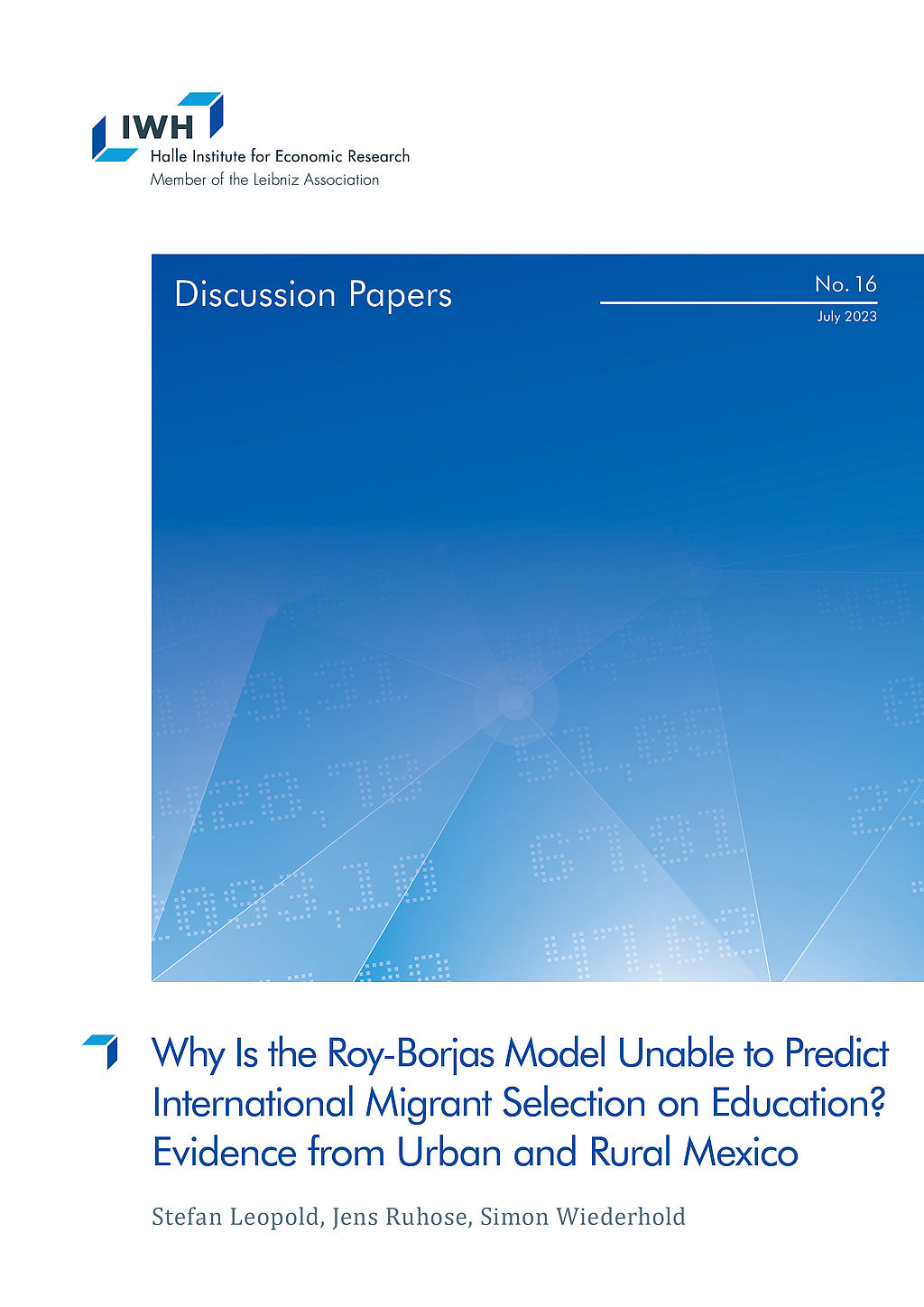
Why Is the Roy-Borjas Model Unable to Predict International Migrant Selection on Education? Evidence from Urban and Rural Mexico
in: IWH Discussion Papers, Nr. 16, 2023
Abstract
The Roy-Borjas model predicts that international migrants are less educated than nonmigrants because the returns to education are generally higher in developing (migrant-sending) than in developed (migrant-receiving) countries. However, empirical evidence often shows the opposite. Using the case of Mexico-U.S. migration, we show that this inconsistency between predictions and empirical evidence can be resolved when the human capital of migrants is assessed using a two-dimensional measure of occupational skills rather than by educational attainment. Thus, focusing on a single skill dimension when investigating migrant selection can lead to misleading conclusions about the underlying economic incentives and behavioral models of migration.


















